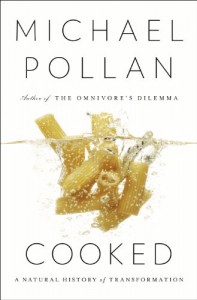Cooked

More than 75% of the food we (husband and I) eat is home-cooked, and we grow a few vegetables and herbs and have a few fruit trees. We aren’t health freaks but we are keen on healthy eating. So, much of this book was simply interesting without being anything of an epiphany.
The author’s relating of the history of food transformation (minus all the speculative evolutionary ‘millions/billions of years’ stuff, meh) and the science of present-day food preparation is quite fascinating. My favorite chapter is the one on Air, which deals with baking bread. There he goes into the history of white flour, which was very eye-opening. The book advocates the use of a sourdough starter for breads, and I’d love for us to look into that. We bake our own whole-wheat bread (my husband does, actually) but we use regular yeast. The other chapters were equally interesting but not to the point of wanting to test out.
His style is engaging; he mixes funny and serious very well, and his accounts of the cooks he met during his research make for lovely snapshots. Also, he relates scientific info in a way that doesn’t make your eyes glaze over. I would definitely read other books by Michael Pollan.
Some excerpts from Cooked:
“The premise of this book is that cooking—defined broadly enough to take in the whole spectrum of techniques people have devised for transforming the raw stuff of nature into nutritious and appealing things for us to eat and drink—is one of the most interesting and worthwhile things we humans do.”
“Cooked is divided into four parts, one for each of the great transformations of nature into the culture we call cooking. Each of these, I was surprised and pleased to discover, corresponds to, and depends upon, one of the classical elements: Fire, Water, Air, and Earth.”
“Taken as a whole, this is a “how-to” book, but of a very particular kind. Each section circles around a single elemental recipe—for barbecue, for a braise, for bread, and for a small handful of fermented items—and by the end of it, you should be well enough equipped to make it. (The recipes are spelled out more concisely in appendix I, in case you do want to try any of them.) Though all the cooking I describe can be done in a home kitchen, only a portion of the book deals directly with the kind of work most people regard as “home cooking.””
“Tongue taste is the straightforward chemical phenomenon that takes place whenever molecules make contact with taste buds, something that happens with any food as a matter of course. Tongue taste is the kind of easy, accessible flavor that any food scientist or manufacturer can reliably produce in order to make food appealing. “McDonald’s has tongue taste,” Hyeon Hee explained.
Hand taste, however, involves something greater than mere flavor. It is the infinitely more complex experience of a food that bears the unmistakable signature of the individual who made it—the care and thought and idiosyncrasy that that person has put into the work of preparing it. Hand taste cannot be faked, Hyeon Hee insisted, and hand taste is the reason we go to all this trouble, massaging the individual leaves of each cabbage and then folding them and packing them in the urn just so. What hand taste is, I understood all at once, is the taste of love.”



 3
3
 4
4
